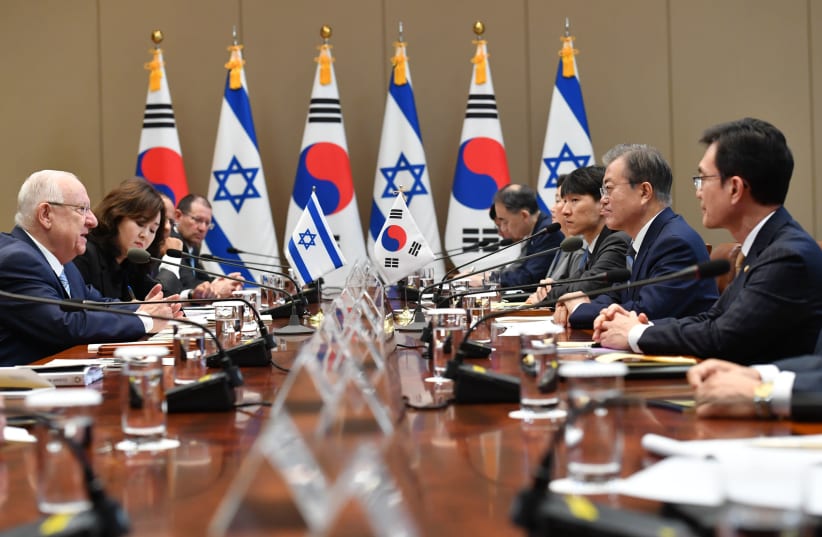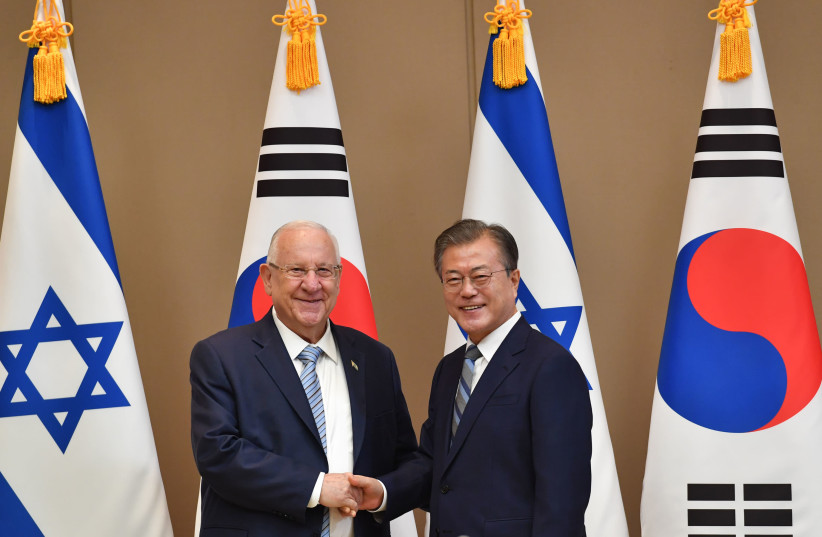A new free-trade agreement between South Korea and Israel came into force in Israel under a Customs Tariff Order and Purchase Tax Exemptions for Goods published on December 5.
The free-trade agreement is more than 500 pages and deals not only with customs-duty exemptions, but also rules of origin, customs procedures, trade remedies, dispute settlements, government procurements, investments, cross-border services, temporary of business persons, telecommunications, e-commerce, intellectual property, the environment, transparency, technical cooperation and more.
In 2021, bilateral trade in goods and services totaled around $3.5 billion, about 35% more than in 2020. Of this, $1.5b. was exported by Israel, some 42% more than in 2020.
According to the Economy Ministry’s Foreign Trade Administration, the resulting customs reductions are expected to benefit Israeli purchasers of Hyundai and Kia automobiles, toys and games, soy sauce and much more. Israeli exporters are expected to benefit to the tune of about NIS 500 million. Israeli companies will enjoy a competitive advantage in the Korean market, and Korean investments in Israel will be encouraged.
More than 95% of Israeli exports to Korea should be exempted from Korean customs duty, including electrical and mechanical equipment, fertilizers, medical devices, cosmetics, plastics, fruit juices and wine. Korea exports to Israel machinery and parts, refrigerators for industry, medical devices, electronic components, plastic products and chemicals.
Intellectual property
The agreement states that each country shall endeavor to maintain intellectual property (IP) regimes that aim to: (a) facilitate international trade and economic, social and cultural development through the dissemination of ideas, technology and creative works; and (b) promote certainty for rights-holders and users of intellectual property in respect of the protection and enforcement of intellectual-property rights.
The countries recognize the need to achieve a balance between the rights of intellectual property right-holders and the legitimate interests of intellectual property users.
The agreement contains detailed additional provisions regarding IP. For more details, see Chapter 14 of the agreement.
How much will Israeli exporters benefit from the agreement?
Here are a few examples. According to the Foreign Trade Administration, customs duties in Korea should immediately be drop to zero for some Israeli products, including fertilizers (previously 6.5% Korean customs), wine (previously 15% customs) and Gamma medical cameras (previously 8% customs).
The Korean customs duty on Israeli lipsticks, eye shadow and skin-care products will be reduced from 6.5% to zero over five years. The Korean customs duty on medical monitoring equipment will be reduced from 8% to zero over three years.
How much will Israeli consumers benefit from the agreement?
According to the Foreign Trade Administration, the customs duties in Israel should immediately drop to zero for some Korean products, including automobiles (previously 7% customs), refrigerators and freezers for industry (previously 12% customs) and soy sauce (previously 4% customs).
The Israeli customs duty on Korean equipment for industry bath tubs and sink units should be reduced from 12% to zero over three years.
Comments
In principle, Israel’s free-trade agreement with Korea is good news, as Korea is an important trading partner and a friend of Israel.
However, we took the liberty of inquiring into the price of new Korean cars (both big automakers), only to find that apparently no 7% reduction has yet been factored into list prices. We were given a variety of unconvincing reasons: perhaps in January 2023; perhaps in June 2023; perhaps prices will go up due to global inflation; perhaps the agreement does not apply to car orders while inventories are being cleared.
The last reason seems regrettably inaccurate, as there are currently low car inventories in Israel, and nearly all delivery dates are months into the future. The message is that if you intend to buy a Korean car or other Korean products, do ask about price discounts reflecting Israeli customs-duty reductions.
As always, consult experienced tax advisers and customs agents in each country at an early stage in specific cases.
leon@h2cat.com
The writer is a certified public accountant and tax specialist at Harris Horowiz Consulting & Tax Ltd.



